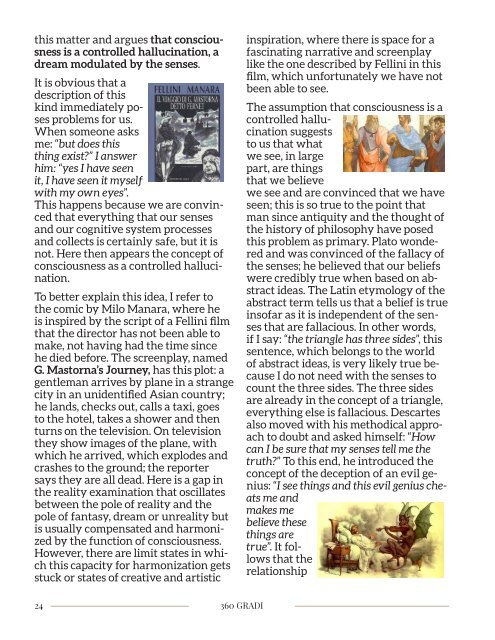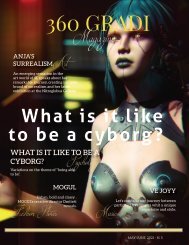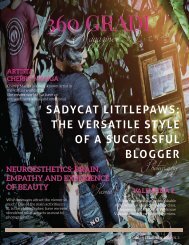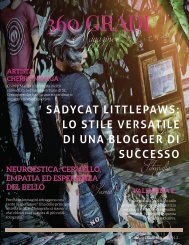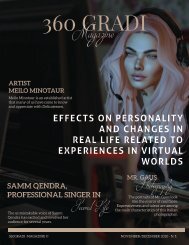360 GRADI MAGAZINE // March-April 2021
360 GRADI Magazine is the trendy, elegant, refined, and sophisticated publishing about Second Life (the virtual world by Linden Lab). Out every two months.
360 GRADI Magazine is the trendy, elegant, refined, and sophisticated publishing about Second Life (the virtual world by Linden Lab).
Out every two months.
Create successful ePaper yourself
Turn your PDF publications into a flip-book with our unique Google optimized e-Paper software.
this matter and argues that consciousness<br />
is a controlled hallucination, a<br />
dream modulated by the senses.<br />
It is obvious that a<br />
description of this<br />
kind immediately poses<br />
problems for us.<br />
When someone asks<br />
me: “but does this<br />
thing exist?” I answer<br />
him: “yes I have seen<br />
it, I have seen it myself<br />
with my own eyes”.<br />
This happens because we are convinced<br />
that everything that our senses<br />
and our cognitive system processes<br />
and collects is certainly safe, but it is<br />
not. Here then appears the concept of<br />
consciousness as a controlled hallucination.<br />
To better explain this idea, I refer to<br />
the comic by Milo Manara, where he<br />
is inspired by the script of a Fellini film<br />
that the director has not been able to<br />
make, not having had the time since<br />
he died before. The screenplay, named<br />
G. Mastorna’s Journey, has this plot: a<br />
gentleman arrives by plane in a strange<br />
city in an unidentified Asian country;<br />
he lands, checks out, calls a taxi, goes<br />
to the hotel, takes a shower and then<br />
turns on the television. On television<br />
they show images of the plane, with<br />
which he arrived, which explodes and<br />
crashes to the ground; the reporter<br />
says they are all dead. Here is a gap in<br />
the reality examination that oscillates<br />
between the pole of reality and the<br />
pole of fantasy, dream or unreality but<br />
is usually compensated and harmonized<br />
by the function of consciousness.<br />
However, there are limit states in which<br />
this capacity for harmonization gets<br />
stuck or states of creative and artistic<br />
inspiration, where there is space for a<br />
fascinating narrative and screenplay<br />
like the one described by Fellini in this<br />
film, which unfortunately we have not<br />
been able to see.<br />
The assumption that consciousness is a<br />
controlled hallucination<br />
suggests<br />
to us that what<br />
we see, in large<br />
part, are things<br />
that we believe<br />
we see and are convinced that we have<br />
seen; this is so true to the point that<br />
man since antiquity and the thought of<br />
the history of philosophy have posed<br />
this problem as primary. Plato wondered<br />
and was convinced of the fallacy of<br />
the senses; he believed that our beliefs<br />
were credibly true when based on abstract<br />
ideas. The Latin etymology of the<br />
abstract term tells us that a belief is true<br />
insofar as it is independent of the senses<br />
that are fallacious. In other words,<br />
if I say: “the triangle has three sides”, this<br />
sentence, which belongs to the world<br />
of abstract ideas, is very likely true because<br />
I do not need with the senses to<br />
count the three sides. The three sides<br />
are already in the concept of a triangle,<br />
everything else is fallacious. Descartes<br />
also moved with his methodical approach<br />
to doubt and asked himself: “How<br />
can I be sure that my senses tell me the<br />
truth?” To this end, he introduced the<br />
concept of the deception of an evil genius:<br />
“I see things and this evil genius cheats<br />
me and<br />
makes me<br />
believe these<br />
things are<br />
true”. It follows<br />
that the<br />
relationship<br />
24 <strong>360</strong> <strong>GRADI</strong>


